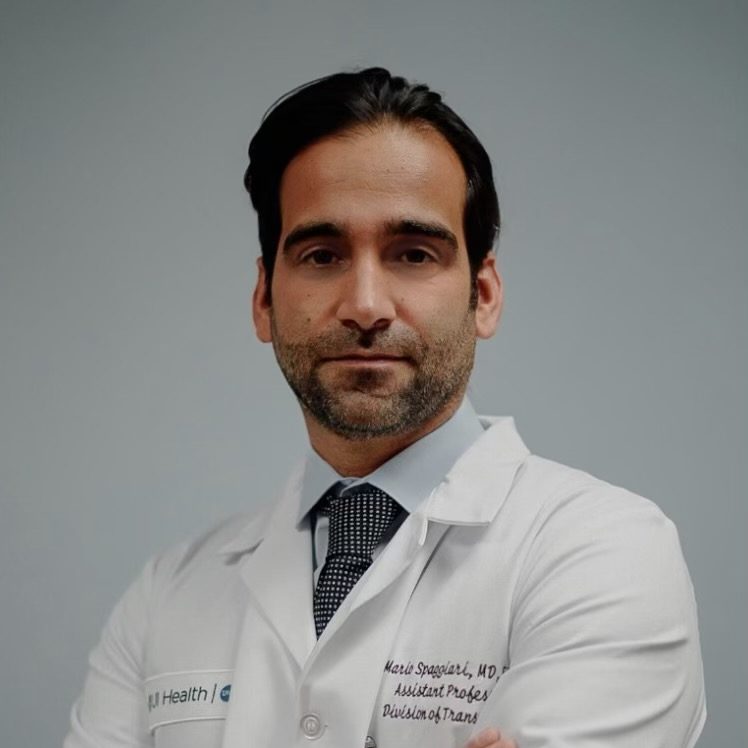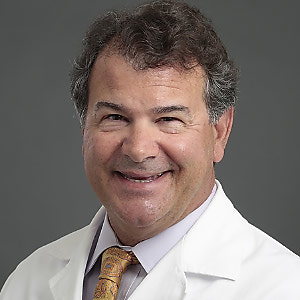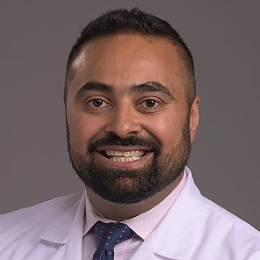
Dr. Mario Spaggiari, MD
Surgeon
840 S. Wood St. Suite 502 Chicago IL, 60612About
Dr. Mario Spaggiari is a general surgeon practicing in Chicago, IL. Dr. Spaggiari specializes in abdominal organ transplantation from both living and deceased donors; hepatobiliary pancreatic surgery for liver, pancreas and biliary cancer and minimally invasive surgery. General surgeons are able to deal with almost any surgical or critical care emergency, also involving the skin or soft tissue trauma. Dr. Spaggiari provides quality surgical service for patients in need of organ transplantation and for patients with complex oncologic cases involving the liver, pancreas and the biliary system.
Education and Training
University of Modena Italy MD 2006
University of Modena Italy General Surgeon 2013
Cleveland Clinic Foundation Transplantation/HPB surgery 2015
University of Illinois Pancreas and Islet transplant 2016
Provider Details

Dr. Mario Spaggiari, MD's Expert Contributions
Robotic-Assisted Placement of Hepatic Artery Infusion Pump for the Treatment of Colorectal Liver Metastases
Surgical resection remains the only definitive treatment for colorectal liver metastasis (CRLM). However, only a minority of cases are deemed resectable at the time of diagnosis. Systemic chemotherapy along with hepatic artery infusion (HAI) is an effective and safe regional chemotherapy modality...
How long can you live without a liver?
I am assuming you are scheduled for a living donor liver transplant. No liver function at all is incompatible with life. Liver transplant is performed when there is still residual function. Allocation of deceased donor livers follow a score named MELD that prioritize the sickest patient. With a MELD of 40 chance of short term survival without liver transplant is limited. READ MORE
My son needs a kidney transplant. For how long would he usually be on the list?
Different regions/states have different waiting times and that depends on the length of the waiting list. On average it would take anything between 2-5 years from the moment he started dialysis. A suitable living donor is, on average, the best option for young recipients, in terms of waiting time (no waiting) and transplant outcome. READ MORE
How long does a liver transplant surgery last?
A transplanted liver could last for the entire life of more than 50% of the population. However, there are many factors that can impact long-term outcomes eg. primary disease, rejections episode, and medications. Please discuss with your hepatology or your surgeon to have better details about your specific case. READ MORE
What are the signs of kidney rejection?
Signs of kidney rejection are usually: decreased urine output, swelling, associated with increased creatinine. Please follow up with your nephrology if any of those symptoms occur. READ MORE
How long should one be on immunosuppressants after a transplant?
For the rest of your life but dosage and type of medications could actually change over time. Initially, you will require more medications and then your hepatologist or nephrologist might decide to discontinue or lower some of the most common antirejection drugs. READ MORE
Can I donate a liver to my son?
Yes, you can, and that is usually the best option for pediatric patients in need of a liver transplant. You need to undergo a thorough workup that includes volume measurements, liver biopsy, and lab work. Once cleared for the donation you can pick a date for your transplant. Good luck! READ MORE
What is the success rate of a liver transplant?
It depends on many factors but is usually pretty high: about 90% in the first year and >70% at 5 years in terms of graft patient survival. READ MORE
When is a person recommended a kidney transplant?
The sooner the better if your relative is medically fit to undergo the operation. READ MORE
Does kidney transplant surgery necessitate a trauma surgeon?
Any type of transplant requires a specialized transplant surgeon. The operation and post-operative management require a unique level of specialization. READ MORE
Can the body reject a transplant after one year?
Rejection of a liver transplant after one year is less common than within the first year, but still possible. Most of the time is due to unexpected level changes in the immunosuppression medications. Treatment is most of the time straightforward with 2-3 days of hospitalization. Keys for long-term success is to be diligent with hepatology follow-up appointments and medications. Mario Spaggiari,MD,FACS Assistant Professor of Surgery Division of Transplantation University of Illinois at Chicago Surgical Director Living Donor Liver Transplant Program ASTS Fellowship Program Director https://hospital.uillinois.edu/primary-and-specialty-care/transplant READ MORE
Is a kidney transplant recommended for a 74 year old person with diabetes?
Thank you for your question. Generally speaking age by itself shouldn’t be a contraindication for kidney transplantation. At the same time, all potential medical conditions associated with aging (eg cardiovascular disease, respiratory diseases, dementia) can play a role in the final pros and cons evaluation. I would suggest having your mother go through the full kidney transplant workup and start broadcasting for a living donor. READ MORE
How long does a transplanted organ last?
Thank you for your question. Many factors, both recipient and donor related, are involved in the final outcome of a liver transplant. On average long term organ and patient outcome are excellent with survival rates beyond 70%. Keys of success after liver transplant are: diligence with antirejection medications and follow up appointments plus physical activity READ MORE
How successful are kidney transplant surgeries?
Kidney transplant is a successful and safe procedure nowadays. It can be done in 2-4 hrs with minimal blood loss and an average of 3-4 days of hospital stay. Chance of primary not function (the kidney graft will never start working) is minimal and related to known donor/recipient risk factors. Chance of delayed graft function (kidney might take up to 3 weeks to work properly) can happen in about 10-15% of the cases especially in the setting of deceased donor donation. Regards READ MORE
What factors must support a liver transplant?
Congenital conditions like biliary atresia are the main indications for pediatric Liver transplantation. Liver deterioration in defined but increased Bilirubin, INR, Creatinine together with intra-abdominal fluid, mental status changes, malnourishment, legs swelling and other "portal hypertension associated" conditions. Most of the time a suitable option is living donor liver transplantation where one of the parents donate about 30% of his/her liver. A thorough workup has to been done by a transplant institution in preparation for the transplant and, as a general rule, it is better to start the process sooner rather than later. Liver transplantation performed at an earlier stage, when clinical conditions are more favorable, is associated with better outcome. READ MORE
What is the window period to know if the body has accepted the transplanted organ?
"Acceptance" of the organ will be always secondary to a proper anti-rejection treatment. With time, however, the dose of anti-rejection medication could be slightly decreased, but that has to be done by your transplant physician. Serum creatinine and urine output are good metrics of the function of a transplanted kidney. READ MORE
Kidney rejection medication?
Good morning, CSA+SRL is a well accepted immunosuppression strategy. I suggest to review all your medications with your transplant nephrologist and do not attempt any changes without proper expert review. READ MORE
I had a liver transplant about 4 months ago and my toes feels like frostbite?
That could be related with some of the medications you are taking to prevent your liver from rejection. I would suggest to schedule an appointment with your transplant hepatologist to review tour medication list and potential side effects READ MORE
Can you live a normal life after a liver transplant?
After proper recovery time following uncomplicated liver transplant is possible to go back to normal routine and that includes working, traveling, physical activities etc. READ MORE
How long are you in hospital after a liver transplant?
Usually that depends from the MELD score ( liver sickness score) at the time of the transplant. It could be anywhere between 5 to 15 days. READ MORE
What anesthesia is used for liver transplant?
Liver Transplantation requires general anesthesia performed by a specialized liver transplant anesthesiologist READ MORE
Areas of expertise and specialization
Faculty Titles & Positions
- Living donor Liver Transplantation surgical director University of Illinois at Chicago 2016 - Present
- Director of ASTS Transplant Fellowship program University of Illinois at Chicago 2016 - Present
Awards
- College of Medicine Rising Star 2019 University of Illinois at Chicago
Professional Memberships
- American Society of Transplant Surgeons
- American College of Surgeons
Professional Society Memberships
- American Society of Transplant Surgeons, the International Liver Transplant Society, the American College of Surgeons, the European Society of Organ Transplantation, and the Clinical Robotic Surgery Association
Areas of research
Dr. Spaggiari main areas of research involve the application of minimally invasive to organ transplantation and oncologic surgery; liver rigeneration surgery (organoids and stem cell transplantation); innovative strategies for desensitization of cross match positive kidney recipients, expansion of the organ pool for transplantation
Dr. Mario Spaggiari, MD's Practice location
Chicago, IL 60612Get Direction
Dr. Mario Spaggiari, MD's reviews
Write ReviewMedia Releases
Get to know Transplant Surgeon Dr. Mario Spaggiari, who serves patients in Chicago, Illinois.
Well versed in the field of transplant surgery, Dr. Spaggiari practices in the Division of Transplantation at UI Health in Chicago, Illinois. He has extensive experience in liver, kidney, pancreas, and intestinal transplantation, in addition to hepatobiliary and pancreatic surgery.
Dr. Spaggiari is specialized in complex liver resections for cancer or metastatic disease of the liver requiring multidisciplinary approach, liver regenerative strategies, and multi stage operations.
The University of Illinois Hospital & Health Sciences System (UI Health) provides comprehensive care, education, and research to the people of Illinois and beyond. Providing safe, high-quality and cost-effective care for their patients is their foremost responsibility. The care of their patients and their families is at the heart of their mission.
A native of Italy, Dr. Spaggiari completed his medical education and residency in general surgery at the University of Modena & Reggio Emilia School of Medicine. Upon relocating to the United States, he completed both an ASTS Multi-Organ Transplantation and Hepatobiliary Fellowship at the Cleveland Clinic and an Islet and Pancreas Transplantation Fellowship at UI Health.
Continuously advancing his efforts, he is an active member of the American Society of Transplant Surgeons, the International Liver Transplant Society, the American College of Surgeons, the European Society of Organ Transplantation, and the Clinical Robotic Surgery Association.
Active in academia, Dr. Spaggiari serves as an Assistant Professor of Surgery at the University of Illinois College of Medicine. He has been published innumerous peer-reviewed journals, presented his work at national and international meetings, and has co-authored several chapters in surgical textbooks.
Transplant surgery refers to surgical procedures in which tissue or an organ is transferred from one area of a person’s body to another area, or from one person (the donor) to another person (the recipient).
As a testament to his success, Dr. Spaggiari has been the recipient of the Rising Star Award by the University of Illinois at Chicago in 2019.
On a more personal note, he is fluent in both English and Italian.
Recommended Articles
- Late Stage Alzheimer's Patients Failing to Get Proper Care
There are some symptoms and conditions that have been discovered over time that stand out as especially difficult when it comes to how healthcare providers and medical specialist centers can help specific patients. Such can be the case for ailments that specifically worsen in the terminal phase of...
- Casino Resort in California Delivers A Thanksgiving Feast to Muscular Dystrophy Patients
Thanks to a generous donation from the executives at the Agua Caliente Casino Resort in Desert Hot Springs, California, patients at Angel View nursing home were treated to a full Thanksgiving feast. ...
- How Can I Prevent Cold Sores?
Cold sores are groups of small fluid-filled blisters that form on and around the lips. These blisters, also known as fever blisters, are sore and reddish in color. As the blister breaks open, the fluid oozes out and forms a crust. In most cases, cold sores resolve within few weeks.Fever blisters are...
- Do You Have Trypophobia?
What is trypophobia?Trypophobia is the fear or feeling of disgust when looking at closely packed holes. Individuals who have trypophobia tend to feel very unsettled the moment they look at things with small clusters of holes that are closely held together. Few of examples would be the head of a...
- Blood Blister: Causes, Symptoms, and Treatment
What is a blood blister?A blood blister is a raised piece of skin that has blood inside it. Blood blisters are somewhat similar to blisters that have clear fluid in them. The blisters are usually harmless and tend to go away within a few weeks without treatment. A blood blister can contain blood,...
- Labyrinthitis and Vertigo
Labyrinthitis is an inflammation of the inner ear due to a virus or bacteria. This inflammation of the inner ear disrupts the transmission of the sensory information to the brain. When it happens, symptoms similar to those of vertigo may be experienced as well as difficulties in vision and hearing....
Nearby Providers
- Timothy Lubenow Other1725 West Harrison St. Chicago IL 60612
- Dr. Ignatius Tang M.D.1740 W TAYLOR ST CHICAGO IL 60612
- Dr. Sreekumar Madassery M.D.1725 W Congress Pkwy Chicago IL 60612
- Dr. Johan F. Nordenstam MD840 S Wood St Chicago IL 60612
- Dr. Khaled Abdelhady M.D.1801 W TAYLOR ST CHICAGO IL 60612
- Thea Price M.D.1725 W Harrison St Chicago IL 60612
Nearest Hospitals
JOHN H STROGER JR HOSPITALl
1901 W HARRISON ST CHICAGO IL 60612











